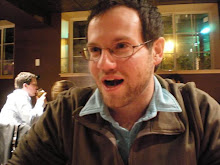
I live a hundred yards (or meters if you prefer) from דרך עזה (Derekh 'Azzah) or شارع غزة (Sha'ara' Gh'azza'h). The Hebrew translates to Gaza Way, the Arabic to Gaza Street. It leads ultimately to Gaza City, and from there one could travel on to Egypt. It is an ancient road. It is the road on which Joseph would have travelled to Egypt having been sold into slavery by his brothers. Later, his brothers would have travelled back and forth on the same path to buy grain from their brother. And finally, Joseph would have brought Jacob's body to Hebron by way of the street where I get my morning coffee.
In some ways it feels like Broadway, in New York. Not at all because of its size or scope (it has two lanes and is lined with a few bakeries, cafes, banks, and a vegetable stand). But because Broadway started as a Native American foot path. Through a series of twists and turns, it connected all the way to what is now Boston. It grew and grew. It isn't always easy to remember, but people walked along its route long before it had Times Square and Zabars (I know it's hard to imagine life before Zabars). In fact people walked along it long before the Europeans arrived.
Derekh Azzah is the same way. It connected the city that is now Jerusalem (it has had many different names) with the Gaza City, which has been known as Gaza from the time it was founded in the 15th century BCE. Around Gaza City, there were archaeological excavations of settlements dating back to circa 4000 BCE. Originally Gaza (or more properly transliterated from the Arabic 'Ghaz'ah) was the seat of the Egyptian Governor of the region.
The word Gaza in English comes from the Arabic, but it is something of a mis-transliteration (they always are). It is spelled almost the same way in both Arabic and Hebrew غ ز ز ة (Arabic) and עזזה (Hebrew). Both languages contract the doubled middle letter. The first letter is the only letter that isn't exactly parallel. In Hebrew, there is a letter called the Ayin (ע), most Americans learn the Ayin as a silent letter but many speakers of Modern Hebrew pronounce it. It is a deep guttural noise, like your soul trying to leave your body through your throat. Arabic also has an Ayin, ع which is the same as the Hebrew ayin. But when you add a dot to it, it gets a bit of a hard G sound as well غ (gAyin). Gaza is spelled with a gayin in Arabic and an Ayin in Hebrew (which doesn't have the equivalent of the gayin). A parallel example might be the n and the ñ (but I leave it to Spanish speakers to correct me).
The root of the word, is the same in both languages. It is the group of root letters (shoresh) for strength. Azzah ends up being something like Stronghold, or The Strong One. In Arabic it has an additional connotation. Prized, the Prized Stronghold, something along those lines.
This is by way of a very brief introduction to the history of a city that is torn up in conflict right now. Before last week, I knew absolutely nothing about the history of Gaza. It is fifty miles (and a hundred yards) from my doorstep, and I had absolutely no idea of how old it is, or that it was once a royal city, or that the Mohammed's father's tomb is in Gaza.
I meet a lot of people here who are unquestioning about this war. To hear their rhetoric is not to hear the heavy heart of a Just War, or a war for survival. It is to hear angry rage-filled cries for vengeance. Vengeance is the worst possible reason for war (a list that starts at bad). Many of them know exactly how many rockets have been fired from Gaza and the number of Israeli civilians injured or killed. But I wonder just how many people know even as much of the history of Gaza as I learned in ten minutes on Wikipedia.
I don't want to come off as dismissive of the suffering of the south of Israel. It must be very hard to live somewhere that at any given moment an air-raid siren goes off. But that fear does not and can not justify the deaths of 900 individuals in the Gaza Strip many of who were civilians and children. The relatively high number of civilian casualties is because Hamas has dug itself into the city underneath civilian infrastructure. And it has done its best to use civilians to shield itself from the IDF. Hamas is unforgivable for attempting to use civilians as human shields. The Israeli Army is unforgivable for killing (even if by mistake or without intent) civilians used as human shields.
On that hopeful note, I'm going to grab some dinner.

No comments:
Post a Comment